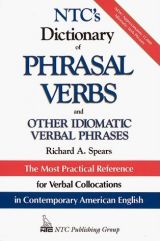


|
|
NTC's Dictionary of Phrasal Verbs and Other Idiomatic Verbal Phrases (Paperback)
by Richard A. Spears
| Category:
Dictionary |
| Market price: ¥ 228.00
MSL price:
¥ 218.00
[ Shop incentives ]
|
| Stock:
Pre-order item, lead time 3-7 weeks upon payment [ COD term does not apply to pre-order items ] |
MSL rating:
 Good for Gifts Good for Gifts |
| MSL Pointer Review:
Contains more than 2,500 definitions of two-word verbs, prepositional verbs, and verbal collections. |
| If you want us to help you with the right titles you're looking for, or to make reading recommendations based on your needs, please contact our consultants. |

Detail |

Author |

Description |

Excerpt |

Reviews |
|
|
|
Author: Richard A. Spears
Publisher: McGraw-Hill
Pub. in: January, 1993
ISBN: 0844254622
Pages: 896
Measurements: 9 x 6.1 x 1.8 inches
Origin of product: USA
Order code: BA00764
Other information: 1 edition
ISBN-13: 978-0844254623
|
|
Rate this product:
|
|
- MSL Picks -
Among the special features of NTC's Dictionary of Phrasal Verbs and Other Idiomatic Verbal Phrases are the following:
- Entry phrases include an indication of wether a direct or indirect object refers to people, things, or both.
- Many phrases can take additional prepositions, prepositional phrases, or particles, and these optional elements are identified in entry phrases, e.g., bend over backwards (to do something) (for someone)
- Verb phrases which are cliches, folksy, informal, stilted, or fugurative, are included and identified accordingly.
- Entries which contain the same verb+particle combination are grouped together making it fast and easy to locate any phrases in the dictionary.
- Each entry has at least two examples which show the important structual variations of the phrase and illustrate its meaning and usage in natural American English.
- The dictionary has clear typography and an easy-to-read layout. there is a minimum of abbrevations and confusing dictionary symbols.
NTC's Dictionary of Phrasal Verbs and Other Idiomatic Verbal Phrases is an ideal reference for learner and others who seek a thorough and practical guide to English verbal collocations.
Target readers:
General readers
|
|
Richard A, Spears, Ph.D., is adjunct Associate Professor of Linguistics, Northwestern University, and specialist in lexicography; English language sturcture; phonetics; language standardization and codification; English as a second language; and American culture. Dr Spears is also the Director of the Dictionary Department at National Textbook Company.
|
|
The most comprehensive dictionary of its kind, NTC's Dictionary of Phrasal Verbs and Other Idiomatic Verbal Phrases, by lexicographer Richard A. Spears, Ph.D., provides definitions and examples for the English verb phrases known as phrasal verbs, two-word verbs, prepositional verbs, and verbal collocations. This dictionary - the only American dictionary of phrasal verbs - contains nearly 14,000definitions and paraphrases of more than 12,000 verb+particle combinations.The entires also include common slang, colloquial, and idiomatic usage.
|
Preface
NTC's Dictionary of Phrasal Verbs and Other Verbal Phrases is designed to be an easy-to-use tool for learners of English. The dictionary covers 2,796 verbs in combination with 71 particles-prepositions or adverbs - in7,634 combinations. There are 13870 definitionsor paraphrases of 12,276 entry heads used in contexts in 29,967 examples.
This dictionary is concerned with combinations of a verb and one or more adverbs or prepositions that fuction together as a single unit of meaning. Some people use phrasal verb as a generic term for all such combination; however, verb+particle collocation is more accurate. Many of the phrases that contain these sequences are idiomatic. That is, even if one knows all the words in a phrase and understands all the grammar of the phrase, the meaning may still not clear. Many sequences that are readily understandable are also included since this book is intended for the new-toEnglish unser as well as for fluent speakers. |
|
Magellan (MSL quote), USA
<2007-02-01 00:00>
English has so many of these because of the decline of prefixes, which started somewhere between Old and Middle English, as Risto Hiltunen documented in his book, "The Decline of the Prefixes and the Beginnings of the English Phrasal Verb," which resulted in the development of separate pronouns and eventually verbal phrases. These are phrases such as "Come up on, run away from, brush up on, run out of," etc. This book documents and defines, as I said, 12,000, and is a very thick book as a result. I don't know how many of these there actually are in English, but 12,000 seems like a lot, so if you need a resource like this, I suspect it will probably have what you want.
|
|
|
|
|